Share this
Advancing as a Scrum Master or Agile Coach with Rowan Bunning
by Brendon Livingstone on 14 June 2019

Scrum is the most popular Agile method in use in the world, and so more than likely your organisation uses Scrum or aspects of it in the work that you do. You may even have people with the title or Scrum Master or you may be one yourself.
The question is are you or the Scrum Masters in your organisation undertaking the role in the best way to deliver on the Agile goals your organisation has.
It was excellent to have Sydney-based Certified Scrum Trainer Rowan Bunning of Scrum WithStyle present to our clients on Wednesday evening on the topic of 'Advancing as a Scrum Master or Agile Coach'. We've partnered with Rowan for over 10 years to deliver Certified Scrum Product Owner, Certified ScrumMaster, and more recently Advanced Certified ScrumMaster training in New Zealand.
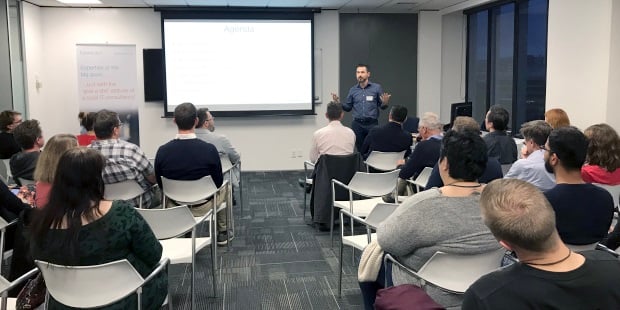
Rowan's main assertion was that Scrum Masters in many organisations are undervalued as often part-time roles for people with other responsibilities, where they undertake functions such as team facilitation, coordination, progress tracking and so forth. Rowan has noted during his training courses that more New Zealand participants appear to undertake the Scrum Master role part-time ("on the side" while they also perform another role) compared to Australia. This could be due to our smaller organisation size and resource constraints.
In this blog post I summarise my interpretation of some of the points Rowan made...
Creating a picture of Wellington Scrum Masters
Rowan put it to the test and ran polls with the group to create a picture of Scrum Masters in Wellington.
What does the Scrum Master role involve?
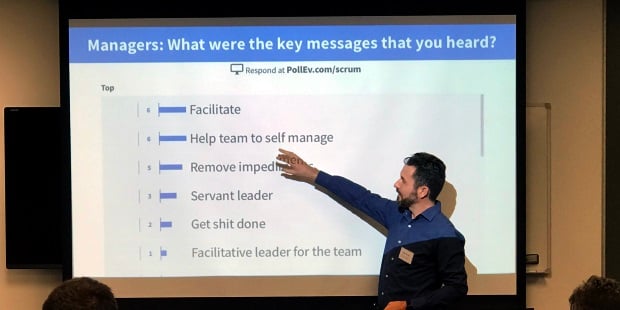
From the poll you can see that the Wellington audience considered the Scrum Master role as (one to):
- Facilitate
- Help team to self manage
- Remove impediments
- Servant leader
- Coach (noting this came onto the list after the above photo was taken)
- Get shit done
- Facilitative leader for the team
Is the Scrum Master role viewed as part-time or full-time at your organisation?
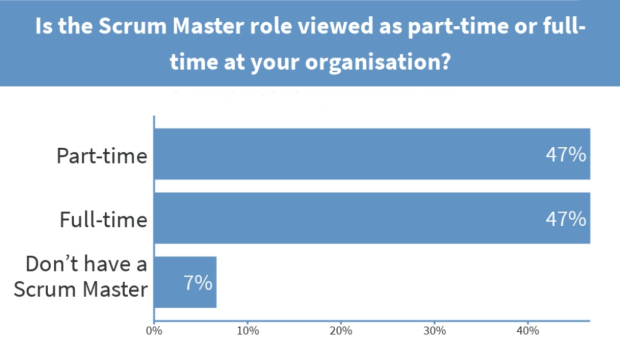
The final result from the Wellington audience was:
- Part time: 47%
- Full-time: 47%
- Don't have a Scrum Master: 7%
How is the primary function of the Scrum Master viewed in your organisation currently?
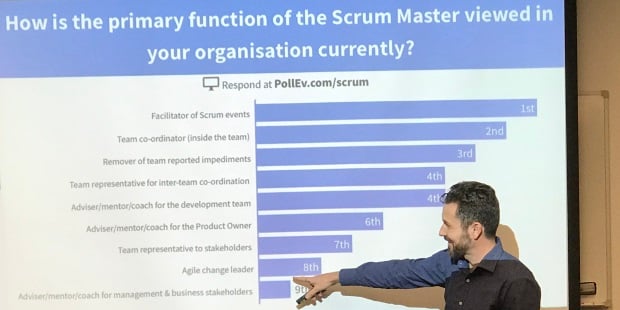
The Wellington audience ordered Scrum Master primary function importance as (noting this final order below evolved further from the order in the above picture):
- Facilitator of Scrum events
- Team co-ordinator (inside the team)
- Adviser/mentor/coach for the development team
- Remover of team reported impediments
- Team representative for inter-team co-ordination
- Adviser/mentor/coach for the Product Owner
- Adviser/mentor/coach for management and business stakeholders
- Agile change leader
- Team representative to stakeholders
Who does a Scrum Master provide service to at your organisation?
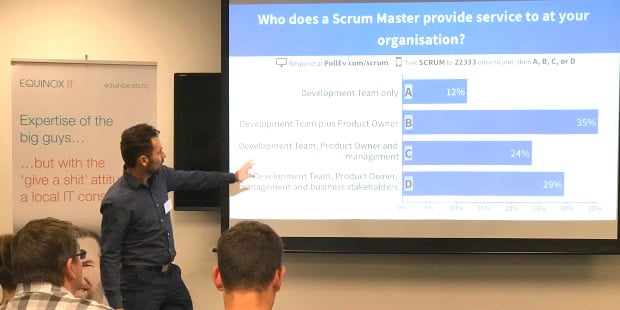
The final result from our Wellington audience was:
- Development team only: 12%
- Development team plus Product Owner: 35%
- Development team, Product Owner and management: 24%
- Development team, Product Owner, management and business stakeholders: 29%
What a Scrum Master is not
Rowan described that a Scrum Master is:
- Not an administrator
- Not a co-ordinator
- Not a part-time role "on the side"
- Not only development team focused
- Not an Agile Delivery Manager / Lead
- Not a Project Manager
- Not responsible for delivery progress
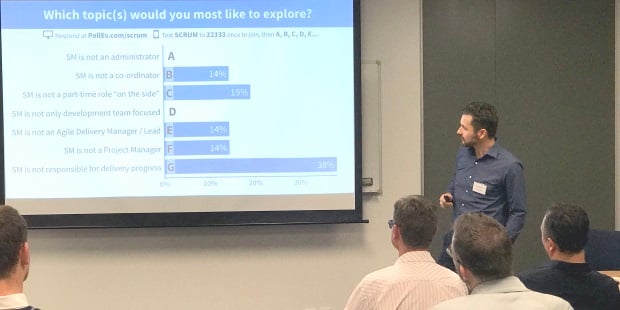
Rowan then asked the audience to vote on which of these topics we wanted to cover in more detail, and 'not responsible for delivery progress' and 'not a part-time role "on the side"' received the highest number of votes.
The Scrum Master is not responsible for delivery progress
Firstly, a Scrum Master is not a Project Manager and Rowan showed some charts from his Certified Scrum Master courses on how the Project Manager role is shared across the roles of Scrum Master, Product Owner and Development Team in Scrum.
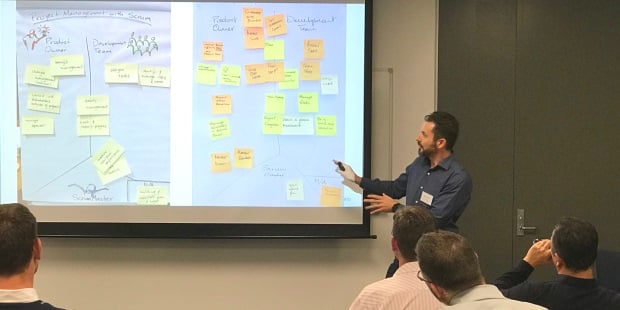
Rowan also showed that in manager-led teams that the manager is responsible for setting direction, designing the team, monitoring and managing work process and progress and that the team is then responsible for executing the team tasks. However, Scrum is not a manager-led team approach, it is either a self-managing team and increasingly recommended that it is a self-designing team. As you can see in the below Authority Matrix in both self-managing teams and self-designing teams the team takes shared responsibility for delivery progress and not the Scrum Master individually.
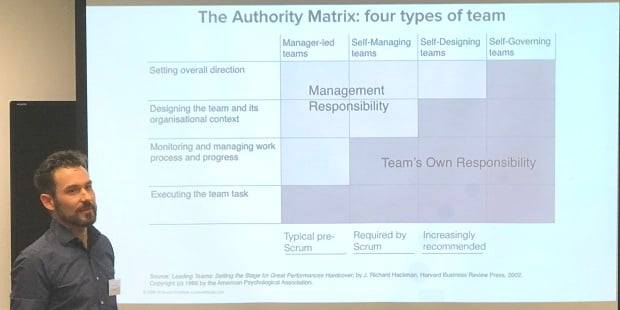
And as Rowan then showed, referencing the 'intrinsic motivation paradox', if the Scrum Master were to be responsible for delivery progress, then they would be more likely to want to control the team, which would decrease intrinsic motivation, reducing team performance, and ultimately placing more pressure on the Scrum Master to deliver.
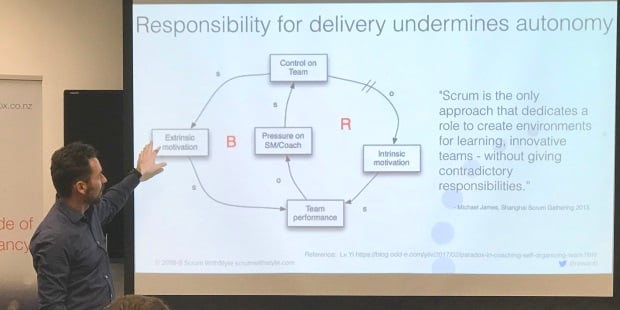
Scrum Master is not a part-time role
Rowan showed a few Australia job adverts where organisations were looking for Business Analysts and other roles, where Scrum Master was tacked on as one component of those roles. However, as Rowan showed, to do the Scrum Master role to the full extent of what is required a full-time role per team is needed. He referenced Michael James's Example Checklist for ScrumMasters were Michael states "If you can check off most of these items and still have time left during the day, I’d like to hear from you".
Scrum Master stances
Rowan described the Scrum Master as operating in these stances:
- Impediment remover
- Facilitator
- Coach
- Teacher
- Servant-leader
- Manager
- Change agent
- Mentor
- Reflective observer
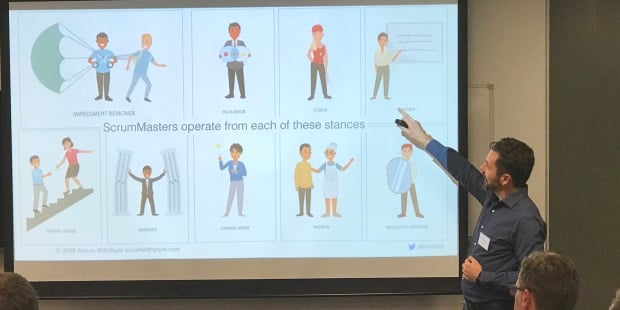
He sees them as needing to 'debug the organisation' in the way that developers debug code.
He sees the role of Scrum Master as a blueprint for what "manager" becomes in progressive management.
Scrum Master development
Rowan acknowledges that the two-day Certified ScrumMaster course is useful, but in two days is "just enough to be dangerous". For those serious about achieving greater potential from the Scrum Master role the Scrum Alliance now have a Scrum Master development path to Certified Scrum Professional which goes from Certified ScrumMaster (CSM) to Advanced Certified ScrumMaste (A-CSM) to Certified Scrum Professional - ScrumMaster (CSP-SM).
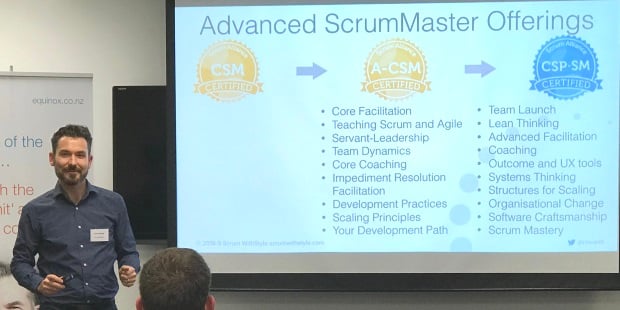
Rowan currently delivers the Certified ScrumMaster and Advanced Certified ScrumMaster courses in New Zealand and later this year will be offering the Certified Scrum Professional - ScrumMaster in New Zealand.
Rowan's slides
Rowan's slides from the event are embedded below and you can also find them here on SlideShare.
Rowan's conclusions
- The Scrum Master role remains widely misunderstood and it's on us to more effectively educate about our role.
- There are far too few Scrum Masters with the skills and confidence to meet the demand of the challenges we face and it's our responsibility to advance our own development - more than 2 days of training is needed!
Rowan, many thanks for taking the time to deliver this excellent presentation, everyone in attendance seemed to gain a significant amount of value from the event.
Share this
- Agile Development (84)
- Software Development (66)
- Scrum (39)
- Business Analysis (28)
- Agile (27)
- Application Lifecycle Management (26)
- Capability Development (20)
- Requirements (20)
- Solution Architecture (19)
- Lean Software Development (17)
- Digital Disruption (16)
- IT Project (15)
- Project Management (15)
- Coaching (14)
- DevOps (14)
- Equinox IT News (12)
- IT Professional (11)
- Knowledge Sharing (10)
- Strategic Planning (10)
- Agile Transformation (9)
- Digital Transformation (9)
- IT Governance (9)
- International Leaders (9)
- People (9)
- IT Consulting (8)
- AI (7)
- Cloud (7)
- MIT Sloan CISR (7)
- ✨ (7)
- Change Management (6)
- Azure DevOps (5)
- Innovation (5)
- Working from Home (5)
- Business Architecture (4)
- Continuous Integration (4)
- Enterprise Analysis (4)
- FinOps (4)
- Client Briefing Events (3)
- Cloud Value Optimisation (3)
- GitHub (3)
- IT Services (3)
- .Net Core (2)
- Business Rules (2)
- Data Visualisation (2)
- Java Development (2)
- Security (2)
- System Performance (2)
- API (1)
- Automation (1)
- Communities of Practice (1)
- Kanban (1)
- Lean Startup (1)
- Microsoft Azure (1)
- Satir Change Model (1)
- Testing (1)
- January 2026 (2)
- November 2025 (1)
- August 2025 (3)
- July 2025 (3)
- March 2025 (1)
- December 2024 (1)
- August 2024 (1)
- February 2024 (3)
- January 2024 (1)
- September 2023 (2)
- July 2023 (3)
- August 2022 (4)
- July 2021 (1)
- March 2021 (1)
- February 2021 (1)
- November 2020 (2)
- July 2020 (1)
- June 2020 (2)
- May 2020 (2)
- March 2020 (3)
- August 2019 (1)
- July 2019 (2)
- June 2019 (1)
- April 2019 (2)
- October 2018 (1)
- August 2018 (1)
- July 2018 (1)
- April 2018 (2)
- January 2018 (1)
- September 2017 (1)
- July 2017 (1)
- February 2017 (1)
- January 2017 (1)
- October 2016 (2)
- September 2016 (1)
- August 2016 (4)
- July 2016 (3)
- June 2016 (3)
- May 2016 (4)
- April 2016 (5)
- March 2016 (1)
- February 2016 (1)
- January 2016 (1)
- December 2015 (5)
- November 2015 (11)
- October 2015 (3)
- September 2015 (1)
- August 2015 (1)
- July 2015 (7)
- June 2015 (7)
- April 2015 (1)
- March 2015 (2)
- February 2015 (2)
- December 2014 (3)
- September 2014 (2)
- July 2014 (1)
- June 2014 (2)
- May 2014 (8)
- April 2014 (1)
- March 2014 (2)
- February 2014 (2)
- November 2013 (1)
- October 2013 (2)
- September 2013 (2)
- August 2013 (2)
- May 2013 (1)
- April 2013 (3)
- March 2013 (2)
- February 2013 (1)
- January 2013 (1)
- November 2012 (1)
- October 2012 (1)
- September 2012 (1)
- July 2012 (2)
- June 2012 (1)
- May 2012 (1)
- November 2011 (2)
- August 2011 (2)
- July 2011 (3)
- June 2011 (4)
- April 2011 (2)
- February 2011 (1)
- January 2011 (2)
- December 2010 (1)
- November 2010 (1)
- October 2010 (1)
- February 2010 (1)
- July 2009 (1)
- October 2008 (1)